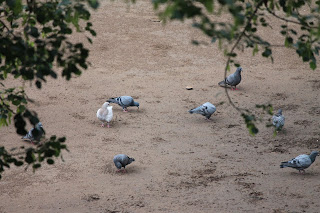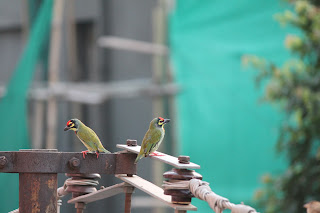It's hard for me to feel elated, ecstatic and upbeat about the day i.e. 15 Aug, our independence day. I am not a pessimist but it's hard to look beyond the 'here and now' and find solace in what we have achieved as a country in all these years and feel as euphoric at least not as we are supposed to feel about it - 'Har Ghar Tiranga', 'Har office Tiranga' and post-selfies about it and 'Amrit kaal' the echoes of which is going to last another 1000 years or so we are told.
Well, people who have tried to control, predict and shape history with their vice like-grips, ever-so-sure about the firmness of their iron-fists, the certainty of results of their actions, infallibility of their designs and programs (or pogroms if you like) have often lived to see something different, unexpected and disastrous befall their el-dorado or utopia. Some of such mythical, imaginative (as they have no base in reality) and utterly nefarious designs, structures and actions may take a few generations to be decimated and pulverised to the dust of time!
Coming back to 'what is' and 'what would be' makes one a bit poignant, a bit pessimistic, almost forcing one to flee and avoid these thoughts and find solace in work, endless distractions on phone, music, Netflix (cinema, webseries) or in travel, yoga or gym, in social occassions, family and other banalities of the day!
Yes, we have achieved many things and the very existence of this nation-state as a sovereign (yes we are not directly governed by another country), democratic (at least in pretention of adult franchise, elections and government) and united (yeah, we haven't had state(s) splinter away from the country, a civil war that resulted in a coo or similar) should be celebrated. We are doing better than ever as economists and statisticians will tell us in terms of well-being not only in economic development (GDP, GDP per capita, roads, ports, airports, infra and what have you!) but also in social indicators of health, education, nutrition etc. Many social disaparities have reduced such as access of girls and socially disadvantaged groups (SC, STs) to primary education, women's participation in economy etc. So what's the crib about?
The gripe isn't about the direction; it's about the pace, the inclusiveness and wholeness (of texture) of this progress or growth we have achieved in all these years after independence.
Let's unpack one by one. The pace or quantum or rate of growth. It's hard to disagree that a faster rate of progress would have been better, that's the nature of any growth, more always seems better! But, haven't we done well looking at the constraints of resources (we were left an extremely poor country) and where we started (our baseline was so low!)? Yes, we have done well compared to where we were (the starting line) but one has to also look at where one should be (the finishing line)! I will quote only one set of statistics of a field I know well - education and can argue, debate with facts, data, experience and understanding. But, I am urging you to reflect if the same is true of other areas of human life.
We have ensured (today and almost for a few years now) that almost all (90% or more) of our primary school going age children are enrolled in some or the other school (government or private). This we should be happy about. Could we have done this earlier ? Yes. There was no reason why we couldn't have started earnest efforts soon after moving education into the concurrent list in 1977; making universal primary education as a national goal as we did after the MDGs prioritised Education for All (EFA) and allocating resources and efforts towards it for the next 20-25 years as we did under Sarva Shiksha Abhiyan (SSA). We could have been where we are today in the early 2000s!
Second, talking about the wholeness of things. Most children are enrolled in schools but only 60-70% of them attend schools regularly. I am taking a larger range to accomodate and avoid discussions about which sources I am using and reliability of one versus the other - ASER, NAS, NFHS or anything else. And as with any avereges, they mask the situation or starkness of data - so Bihar, UP (and that's a lot) attendance situation is 45-60%. Enrolment is not schooling ! My name is there in a school register, is not equal to I go to school. Simple?
Third, more than half of the children in the schools are not learning the foundational skills of reading, writing and basic maths. The world bank calls it 'learning poverty', some of us call it a 'learning crisis' and even 'learning emergency'. It is all of that. Again, let's not get into statistics, data reliability, incentives or under or over reporting here. I can separately engage on it. More than half of all children (mind you this is regardless of private or public) of primary age not learning or acquiring these basic universal skills would means crores of children, 7-8 crores of them ! Let that sink in slowly, take your time.
To come back to the inclusiveness of the progress. It shouldn't be too hard to guess who would be the majority of these 7-8 crore children. Children belonging to SC, ST, religious minorities, remote rural areas, girls, children enrolled in all government or affordable private schools? In other words, children of poor parents or parents who are unable to spend large amount of money on their child's education or life. That's the single biggest determinant - parental income. So, income poverty is the reason for learning poverty and further those children who are subjected to learning poverty today are the ones who will very likely suffer from income poverty as they become adults and start their families due to lack of these basic universal skills. I used the word subjected to learning poverty as we the state (people of this republic) are responsible for it not the child.
We even guaranteed it (mind you not enrollment in schools, but education or learning) as a fundamental right ! So, if the children are not learning, we have failed to provide and ensure that right for them.
I want to end with 'what would be' and yet again in this age and times of post-truth (basically falsehood) something that doesn't give a lot of scope for optimism is that if we are not aligned on a single picture of reality today how can we on the plans and direction of future. In fact to make matters worse, some people are actively attempting to change 'what was' i.e. history! What happened, happened! Yes, we know that certain narratives get more prominence than others - that of the victors and that of the rulers but alternative narratives do exists and they come out in their own time and space. It is for the students of history and others interested to pick a wholesome meal out of this buffet of narratives. But for a section of those who are ruling today (and in majority) for the furtherance of a bigoted agenda, driven by the desire to shape the future, it's not very scientific or healthy to attempt to change the past.
That's worrisome yet again not just because we are making a mistake or many mistakes or going down the wrong path! That we have done many times in the past and will continue to do so. It's the systematic shutting down or the attempts to shut down the possibility of learning (from our mistakes and successes both) that's the most concerning for me. Starting with poor learning for children but certainly extending all the way to the very poor learning (or re-learning tending to brainwashing) of adult-citizen, fuelled and fully aided by media, technology and the powers of narratives.
Societies and nations will continue to make mistakes and have deep rootes challenges of class-divide, caste (this is our special contribution), religion, region, language, sex, sexual-orientation and everything else that can divide (and interestingly unite) the homo-sapien but as long as we learn there is hope !
There is !
Sincere, apologies for lack of editing and mistakes. I just typed this whole thing on phone and posted it.


























